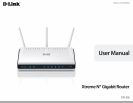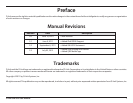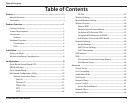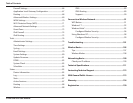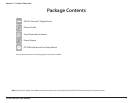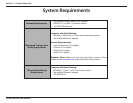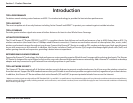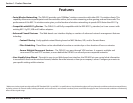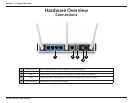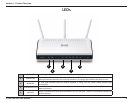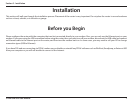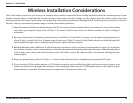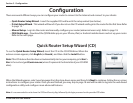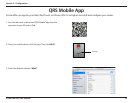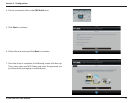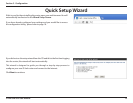
3D-Link DIR-655 User Manual
Section 1 - Product Overview
Introduction
TOTAL PERFORMANCE
Combines award winning router features and 802.11n wireless technology to provide the best wireless performance.
TOTAL SECURITY
The most complete set of security features including Active Firewall and WPA2™ to protect your network against outside intruders.
TOTAL COVERAGE
Provides greater wireless signal rates even at farther distances for best-in-class Whole Home Coverage.
ULTIMATE PERFORMANCE
The D-Link Xtreme N™ Router (DIR-655) is a 802.11n compliant device that delivers real world performance of up to 650% faster than an 802.11g
wireless connection (also faster than a 100Mbps wired Ethernet connection). Create a secure wireless network to share photos, les, music, video,
printers, and network storage throughout your home. Connect the Xtreme N™ Router to a cable or DSL modem and share your high-speed Internet
access with everyone on the network. In addition, this Router includes a Quality of Service (QoS) engine that keeps digital phone calls (VoIP) and
online gaming smooth and responsive, providing a better Internet experience.
EXTENDED WHOLE HOME COVERAGE
Powered by Xtreme N™ technology, this high performance router provides superior Whole Home Coverage while reducing dead spots. The Xtreme
N™ Router is designed for use in bigger homes and for users who demand higher performance networking. Add a Xtreme N™ notebook or desktop
adapter and stay connected to your network from virtually anywhere in your home.
TOTAL NETWORK SECURITY
The Xtreme N™ Router supports all of the latest wireless security features to prevent unauthorized access, be it from over the wireless network or
from the Internet. Support for WPA standards ensure that you’ll be able to use the best possible encryption method, regardless of your client devices.
In addition, this Xtreme N™ Router utilizes dual active rewalls (SPI and NAT) to prevent potential attacks from across the Internet.
* Maximum wireless signal rate derived from IEEE Standard 802.11g and 802.11n specications. Actual data throughput will vary. Network conditions and environmental factors,
including volume of network trac, building materials and construction, and network overhead, lower actual data throughput rate. Environmental conditions will adversely
aect wireless signal range.



